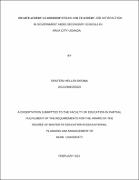| dc.contributor.author | Drateru, Hellen Droma | |
| dc.date.accessioned | 2024-03-29T08:55:04Z | |
| dc.date.available | 2024-03-29T08:55:04Z | |
| dc.date.issued | 2024-02-02 | |
| dc.identifier.citation | Drateru, H. D. (2024). Headteachers’ leadership styles and teachers’ job satisfaction in government aided secondary schools in Arua City-Uganda (unpublished graduate dissertation). Muni University, Arua, Uganda. | en_US |
| dc.identifier.uri | http://dir.muni.ac.ug/xmlui/handle/20.500.12260/627 | |
| dc.description | A desertation submitted to the Faculty of Education in partial fulfillment of the requirements for the award of a Master's Degree in Educational planning and management of Muni University. | en_US |
| dc.description.abstract | The study aimed to investigate the relationship between head teacher’s leadership style and teachers’ job satisfaction in government aided secondary schools in Arua City. The objectives of the study were to examine the relationship between the head teachers’ autocratic leadership Style and teacher` s job satisfaction in government aided secondary schools in Arua City. To investigate the relationship between the head teachers’ democratic leadership style and teachers` job satisfaction in government aided secondary schools in Arua City. To establish the relationship between the head teachers’ laissez-faire leadership style and teachers` job satisfaction in government aided secondary schools in Arua City. To assess the relationship between the head teachers’ transformational leadership style and teachers` job satisfaction in government aided secondary schools in Arua City. A cross-sectional study design was used. Both quantitative and qualitative approaches were adopted with a sample of 162 respondents. Simple random sampling technique was used to select amongst the teachers, while purposive sampling was used to select head teachers, deputy head teachers and director of studies. Quantitative data analysis consisted of descriptive statistics (frequencies and percentages) and inferential statistics (Pearson correlation (r), regression statistics and ANOVA) with the help of Statistical Package for Social Scientists (SPSS) version 25, while qualitative analysis used thematic approach. Findings revealed a significantly moderate negative correlation (r= -.537) between autocratic leadership style and job satisfaction; a moderate positive correlation (r= .596) between democratic leadership style and job satisfaction; a weak negative significant correlation (r= -.280) between laissez-faire leadership style and job satisfaction; a moderate significantly positive correlation (r= 0.727) between transformational leadership style and job satisfaction. Thus, it was concluded that head teachers’ leadership style significantly affected job satisfaction of teachers in government aided secondary schools in Arua city of Uganda. It is recommended that management of government aided secondary schools of Uganda should focus much on democratic leadership, and transformational leadership styles, less on laissez-faire leadership style but avoid autocratic leadership to improve job satisfaction of teachers in secondary schools. | en_US |
| dc.language.iso | en | en_US |
| dc.publisher | Muni University | en_US |
| dc.subject | Leadership styles | en_US |
| dc.subject | Teacher job satisfaction | en_US |
| dc.subject | Government aided secondary school | en_US |
| dc.subject | Arua City | en_US |
| dc.subject | Uganda | en_US |
| dc.title | Headteachers’ leadership styles and teachers’ job satisfaction in government aided secondary schools in Arua city-Uganda. | en_US |
| dc.type | Thesis | en_US |

